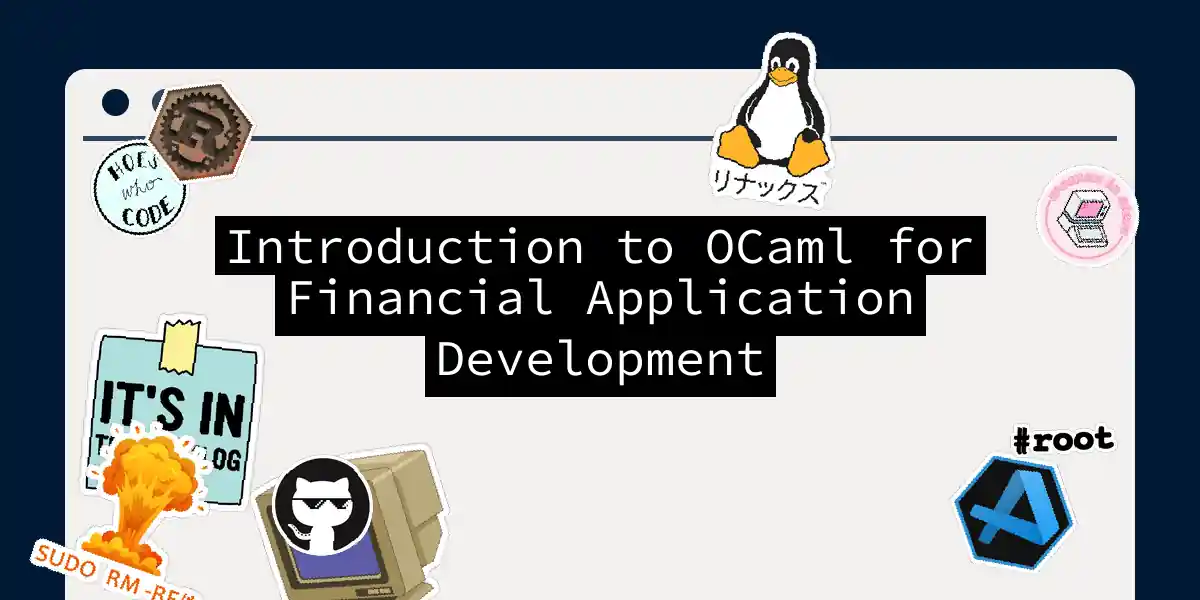Why OCaml for Financial Applications?
In the fast-paced world of financial applications, where milliseconds can make or break a trade, the choice of programming language is crucial. OCaml, a functional programming language, has been gaining traction in this domain due to its unique set of features that make it an ideal candidate for building robust, efficient, and reliable financial software.
Readability and Correctness
One of the primary reasons financial companies like Jane Street and LexiFi have adopted OCaml is its emphasis on readability and correctness. In an industry where faulty software can lead to catastrophic losses, OCaml’s strong type system and concise syntax help ensure that code is not only efficient but also correct and maintainable[2].
Here’s a simple example of how OCaml’s type system can help prevent errors:
let add x y =
x + y
let result = add 5 10
In this example, the add function is defined with explicit types, which helps catch type-related errors at compile time rather than runtime.
Performance
OCaml is known for its performance, which is critical in financial applications where speed can significantly impact profitability. The OCaml compiler generates highly optimized code, and its runtime environment is designed for efficiency. For instance, Jane Street Capital uses OCaml for critical trading systems that require rapid responses to market updates, handling tens of thousands of updates per second[2].
Contract Algebra and Combinators
LexiFi, a leading provider of software solutions for managing derivative contracts, leverages OCaml’s algebraic data types and combinator libraries to represent and manipulate financial contracts. This approach allows for the efficient management of complex financial products and seamless integration with various data formats.
Here’s an example of how a contract might be represented using OCaml’s algebraic data types:
type contract =
| Call of { strike_price: float; expiration_date: string }
| Put of { strike_price: float; expiration_date: string }
| Swap of { fixed_rate: float; floating_rate: float }
let calculate_contract_value contract =
match contract with
| Call { strike_price; expiration_date } -> (* calculate call option value *)
| Put { strike_price; expiration_date } -> (* calculate put option value *)
| Swap { fixed_rate; floating_rate } -> (* calculate swap value *)
Importing and Converting Contracts
One of the challenges in financial software development is importing contracts from various formats and converting them into a unified internal representation. LexiFi uses OCaml’s combinator libraries to parse and analyze documents in formats like PDF, XML, and others, and then convert them into their internal contract algebra.
Here’s a simplified example of how this might be done using OCaml’s camlpdf library to parse PDF documents:
open Camlpdf
let parse_pdf_contract pdf_file =
let pdf = Pdfread.pdf_of_file pdf_file in
let pages = Pdfread.get_pages pdf in
(* Extract relevant data from PDF pages *)
(* Convert extracted data into internal contract representation *)
Sequence Diagram: Contract Import and Conversion
Quantitative Research and Trading Systems
OCaml is also extensively used in quantitative research and trading systems due to its ability to handle complex computations efficiently. Jane Street Capital, for example, uses OCaml for batch research applications that perform complex computations on hundreds of gigabytes of data[2].
Here’s an example of how OCaml might be used for a simple Monte Carlo simulation:
let monte_carlo_simulation num_simulations =
let results = Array.init num_simulations (fun _ -> (* simulate and calculate result *)) in
Array.fold_left ( +. ) 0.0 results /. float num_simulations
let average_price = monte_carlo_simulation 1000000
Conclusion
OCaml offers a unique combination of readability, correctness, and performance that makes it an excellent choice for developing financial applications. From managing complex financial contracts to performing high-speed trading and quantitative research, OCaml has proven itself as a reliable and efficient tool in the financial sector.
Whether you are building a trading system that needs to react in milliseconds or developing software to manage intricate financial products, OCaml is definitely worth considering. Its strong type system, efficient compiler, and robust ecosystem make it a powerful ally in the world of financial software development. So, if you haven’t already, it’s time to give OCaml a try and see how it can transform your financial application development process.
